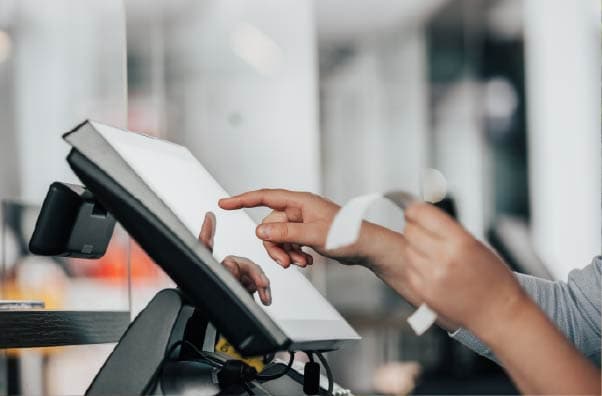You may be wondering, what is a POS cash register? Is a POS system actually the same as a cash register? There’s a lot to keep in mind when you’re trying to decide the best payment system for your hotel, as it can greatly impact your ability to drive profit. While they’re both similar means of accepting payments, at the same time they’re also quite different in some important ways.
We’ll take a closer look at both a POS system and a cash register as well as their differences, so you’re better equipped to understand which one is right for you. After all, having a streamlined way of accepting payments is at the heart of profitability and efficiency.
Table of contents
What is a cash register?
A cash register, or a “till”, is a typical machine you’ll find at a grocery store or major department store, which nowadays are mostly digital. It holds cash, and it is used to record and calculate transactions, usually at a brick and mortar store. They usually have the ability to calculate taxes and print receipts. The register essentially logs the cash coming in and coming out at your store or hospitality business.
The basic version of a till is very inexpensive, allowing you to handle cash transactions, calculating the total due and taxes, registering the incoming money and the money going out, as well as opening up a drawer where the cash is stored. The more advanced versions come with credit card readers, barcode scanners and scales, but of course in order to use these features you’ll need to purchase the additional hardware.
What is a POS system?
A POS system, or point of sale system, is the place where transactions are carried out in exchange for goods or services. These transactions can either be done in person or online, and are tracked digitally. A POS is capable of generating business data, tracking inventory, and a wealth of other functionalities, which it does by combining hardware and software.
As many POSs are cloud-based, they are easily able to sync up with your business’ other systems like your inventory management system, accounting program, as well as your hotel’s property management system. In this way it can help you manage customer loyalty programs, marketing, guest profiles, automation and personalization, among many other functionalities.
What are the differences between a POS system and a cash register?
There are many differences between these two kinds of payment systems, which we will look at in more detail below.
Business insights
While a regular cash till will be able to tell you how much cash came in and how much came out on a given day, other business insights are not possible. On the other hand, a POS can give you insights into customer data, profitability, sales, and the areas that are performing better in your business, which can help you to make data-driven decisions to improve your hotel’s functioning.
Efficiency
Arguably, one of the biggest differences between these two ways of carrying out transactions is efficiency. A cash register, beyond helping you understand what was purchased in a given period, has many limitations. A POS, however, can track everything related to that purchase, including tax information, which is then stored in a database. This database is a goldmine for understanding purchasing behavior and for creating guest profiles.
This database is also key to efficiency because it automatically keeps track of inventory so your purchasing manager knows when to order more stock of any given item, especially in the bar and restaurant of your hotel or for housekeeping. The better you can keep track of what comes in and out, the more efficient your operations will be.
Sales management
While tills have limited hardware and software focused on managing sales, for a POS, managing sales is just one of many functions it has. By managing sales with a POS, you can easily understand the most popular menu items are your hotel’s bar or restaurant, customer buying patterns, your most productive employees, and which areas of the hotel are working well and could use improvement.
Discover how to use data to drive faster and more impactful product decisions.
Customer interaction
With a traditional cash register, the only interaction a customer might have with the register is by swiping their credit card on the credit card reader. On the other hand, a POS system allows guests to play a key role in the payment journey. Guests can use your hotel restaurant POS to view menus and place their order, or to pay their room bill or room service.
These customer-facing terminals can be used to boost incremental revenue and tips by enabling the suggested tip amounts functionality. When faced with the decision in front of one of your hotel staff, chances are guests will leave a tip, and tips are great for employee satisfaction.
Find more tools to boost your upselling game.
Features
It goes without saying that a POS has features that are just not comparable to a standard register. A register has simple functionalities, allowing you to ring up items and give customers their correct change. There are some add-ons like we talked about before, but nothing in comparison to a POS.
A point of sale system allows you to manage inventory, get customer insights, and interact better with your customers at the time of making payments. It can integrate with different apps and allows you to manage employees and their schedules, while at the same time tracking sales trends, discounts, and a range of analytics across all your properties.
Employee management
One of the best ways to drive efficiency as a hotelier is by having a well-trained and functioning team. A till can tell you how much any given employee brought in on a given day, but a point of sale offers a range of powerful data that can help you better optimize your human resources.
You can use a POS solution to schedule your employees and manage tips, and it will help you to understand employee performance, learning which employee is your strongest performer and which employee is struggling. This way, you can better manage your employees and improve communication about what is working and where your hotel’s shortcomings are.
Conclusion
Now that you’ve understood these two methods of collecting payments and their key differences, you’re ready to make the decision that will directly affect the guest’s payment journey at your hotel, and your hotel’s ability to leverage data to increase profitability and efficiency. By choosing a POS solution, you are unlocking functionalities that far exceed the capabilities of a traditional cash register.
Six Benefits of Combining Your PMS and POS
Discover why choosing a hospitality cloud with a built-in POS creates a more seamless guest experience and streamlines processes for your teams.

Author
Eva Lacalle
Eva has over a decade of international experience in marketing, communication, events and digital marketing. When she's not at work, she's probably surfing, dancing, or exploring the world.

Essential hotel technology for general managers
Download now
Hospitality hot takes straight to your inbox


.webp)